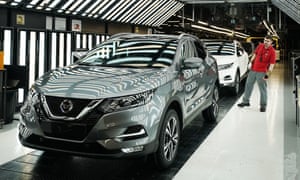Carmaker considers focusing on UK market if there are tariffs on exports, according to report

Workers on the production line at Nissan’s factory in Sunderland.
Photograph: Owen Humphreys/PA
Nissan has reportedly drawn up contingency plans to pull out of manufacturing in mainland Europe in the event of a hard Brexit in favour of ramping up its production in the UK.
If a trade deal is struck between the UK and the EU that leads to tariffs on car exports, the Japanese carmaker would focus on selling more cars in Britain, the Financial Times reported, citing two people involved in the discussions.
Under the proposal drawn up towards the end of last year, Nissan would maintain its factory in Sunderland and aim to boost its 4% UK market share to about 20%. At the same time, it would shut its struggling van factory in Barcelona and stop manufacturing in France.
The contingency plan is said to be one of several drawn up in preparation for post-Brexit tariffs and was drafted before Makoto Uchida became Nissan’s chief executive on 1 December, the FT reported.
Nissan denied having made such a plan, however, and said its Sunderland plant would be under threat along with its European operations if the UK fails to ensure tariff-free access to the EU market. After the UK’s departure from the EU on Friday, both sides are expected to set out their negotiating positions on Monday before trade talks next month.
A Nissan spokesman said on Monday: “We deny such a contingency plan exists. We’ve modelled every possible ramification of Brexit and the fact remains that our entire business both in the UK and in Europe is not sustainable in the event of WTO [World Trade Organization] tariffs.
“We want our UK team of more than 7,000 people to have the best possible chance of future success, which is why we continue to urge UK and EU negotiators to work collaboratively towards an orderly balanced Brexit that will continue to encourage mutually beneficial trade.”
Gianluca de Ficchy, the chairman of Nissan Europe, already warned in October that the imposition of a 10% tariff on exports under WTO terms would put Nissan’s entire European business model in jeopardy.
Sunderland is the UK’s largest car factory and employs 6,000 workers. It makes three of Nissan’s five flagship models – the Qashqai, the Juke and the electric Leaf.
Under the contingency plan, production of the Micra, which is made in France, would be moved to the UK and Nissan would reconsider producing the X-Trail in Sunderland. A year ago, it decided not to make the new version of the X-Trail in Sunderland, citing Brexit uncertainty.
David Bailey, the professor of industrial strategy at Aston Business School, said Nissan’s plan was likely to be only one of multiple options and did not signal a vote of confidence in Britain’s prospects in the event of a hard Brexit.
“Nissan has certainly been doing scenario modelling and it’s not clear how current this planning is,” he said.
“It’s one possible response to the hard Brexit scenario but I don’t think it’s a feasible plan.”
Bailey said it was unlikely Nissan could gain the 20% market share cited as a key requirement for the Japanese carmaker to gamble on focusing its efforts in the UK.
He said carmakers with operations in Europe would have to reconfigure their operations, potentially resulting in some models being built in Britain that were not previously. However, he said this would not always work to the UK’s advantage.
“You would see production shift in both directions. Some production would come to the UK for the UK market and some would go to Europe.
“Given the size of the European market, the size of the movement that way would be much greater, so overall it would be a hit to UK automotive.”